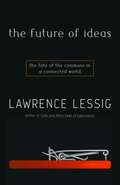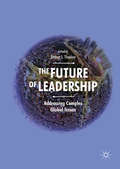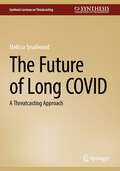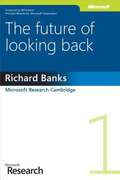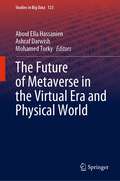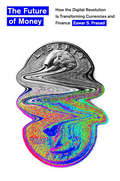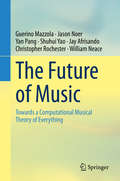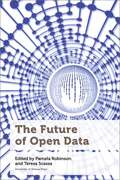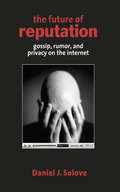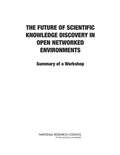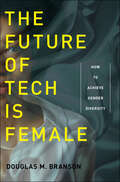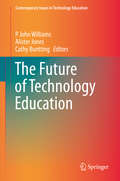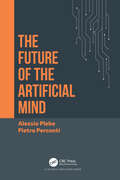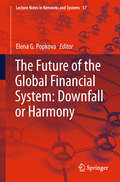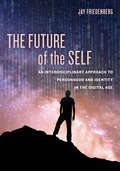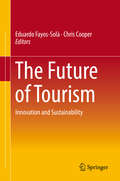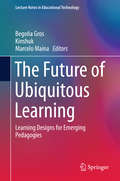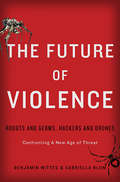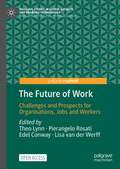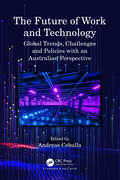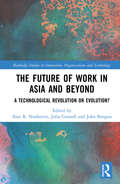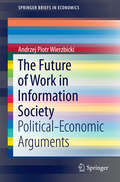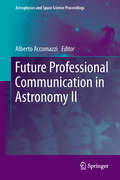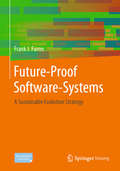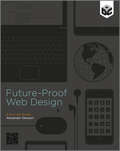- Table View
- List View
The Future of Ideas
by Lawrence LessigLawrence Lessig informs us about the downfalls of today's technological advancements and the emerging threat to our freedom as well as to our innovative spirit. The author and publisher of this book donated a digital copy to Bookshare.org. Join us in thanking Lawrence Lessig and Random House for providing this accessible digital book to this community.
The Future of Leadership: Addressing Complex Global Issues
by Bharat S. ThakkarThis book deals with leadership trends in the next decade and beyond. It critically examines how knowledge management can be used to address emerging societal and business issues, such as sustaining complex product quality, controlling automation generated unemployment, increasing cyber insecurity in virtual workforce environment, and unstable government and market trends. These issues require unique leadership qualities to be effective in extremely challenging business and socio-political environments. Included among the topics explored by the authors in this book are: investment for the development of diverse human capital, use of data analytics for performance improvement, declining demographic dividends in population deficient areas, and globally increasing women and minority education and employment. Scholars in business and economics, and managers in industry and government will find this book to be a valuable resource in exploring new directions for the future development of leadership.
The Future of Long COVID: A Threatcasting Approach (Synthesis Lectures on Threatcasting)
by Melissa SmallwoodThis book provides an overview of Long COVID, the chronic illness and disability that can result from COVID-19 infection in 20–30% of survivors. It approaches the topic through its larger social, political, and historical context utilizing the Threatcasting methodology for scenario-based foresight. The book brings together multiple perspectives on Long COVID, such as patient experiences, healthcare system impacts, historical frameworks, and the information ecosystem surrounding COVID to explore the long-term structural implications of Long COVID beyond the current acute crisis. It is intended to be a guide for policy makers, healthcare providers, researchers, and anyone whose work will play a role in mitigating the long tail of COVID-19. Framing the pandemic within a historical and political framework while approaching Long COVID from the future-casting perspective, this book seeks to disentangle the issues posed by Long COVID from the current moment and is intended to establish new ways of thinking about and preparing for similar complex, over-the-horizon potential threats. The first book to apply the Threatcasting framework to a public-health issue like COVID-19Draws together multiple perspectives of Long COVID that were previously discussed independently within their fieldsComprehensively examines the history and future of Long COVID
The Future of Looking Back
by Richard BanksWhat will we leave behind in this new digital age? As digital technology takes an ever-increasing role in our lives, one question is how we'll manage our collections after we're gone. What takes the place of shoeboxes full of pictures and dog-eared record albums? Get an inside look at Microsoft researcher Richard Banks's thinking about how we might manage the digital artifacts and content we're creating now--and how we might pass on or inherit these kinds of items in the future. About the Microsoft Research Series At Microsoft Research, we're driven to imagine and to invent. Our desire is to create technology that helps people realize their full potential, and to advance the state of the art in computer science. The Microsoft Research series shares the insights of Microsoft researchers as they explore the new and the transformative.
The Future of Metaverse in the Virtual Era and Physical World (Studies in Big Data #123)
by Aboul Ella Hassanien Ashraf Darwish Mohamed TorkyThis book is divided into three parts. The first part discusses the Metaverse's basics, development, and optional applications such as 3D virtual dressing room-based user-friendly Metaverse, the use of Metaverse in the healthcare and environment sectors as well as the ethics of the Metaverse and digital virtual environments. Part two presents some chapters that discuss emerging technologies in the Metaverse world including IoT, digital twining, and artificial intelligence and shows its impact on climate change. The third part contains chapters discussing cybersecurity in the Metaverse including blockchain technology opportunities and applications and the threat of the digital humanities in the Metaverse. The book is suitable for students and academics aiming to build up their background on the Future of the Metaverse in the Virtual Era and Physical World.
The Future of Money: How the Digital Revolution Is Transforming Currencies and Finance
by Eswar S. PrasadA cutting-edge look at how accelerating financial change, from the end of cash to the rise of cryptocurrencies, will transform economies for better and worse. We think we’ve seen financial innovation. We bank from laptops and buy coffee with the wave of a phone. But these are minor miracles compared with the dizzying experiments now underway around the globe, as businesses and governments alike embrace the possibilities of new financial technologies. As Eswar Prasad explains, the world of finance is at the threshold of major disruption that will affect corporations, bankers, states, and indeed all of us. The transformation of money will fundamentally rewrite how ordinary people live. Above all, Prasad foresees the end of physical cash. The driving force won’t be phones or credit cards but rather central banks, spurred by the emergence of cryptocurrencies to develop their own, more stable digital currencies. Meanwhile, cryptocurrencies themselves will evolve unpredictably as global corporations like Facebook and Amazon join the game. The changes will be accompanied by snowballing innovations that are reshaping finance and have already begun to revolutionize how we invest, trade, insure, and manage risk. Prasad shows how these and other changes will redefine the very concept of money, unbundling its traditional functions as a unit of account, medium of exchange, and store of value. The promise lies in greater efficiency and flexibility, increased sensitivity to the needs of diverse consumers, and improved market access for the unbanked. The risk is instability, lack of accountability, and erosion of privacy. A lucid, visionary work, The Future of Money shows how to maximize the best and guard against the worst of what is to come.
The Future of Music: Towards a Computational Musical Theory of Everything
by Guerino Mazzola Yan Pang Jason Noer Shuhui Yao Jay Afrisando Christopher Rochester William NeaceThe idea of this monograph is to present an overview of decisive theoretical, computational, technological, aesthetical, artistic, economical, and sociological directions to create future music. It features a unique insight into dominant scientific and artistic new directions, which are guaranteed by the authors' prominent publications in books, software, musical, and dance productions.Applying recent research results from mathematical and computational music theory and software as well as new ideas of embodiment approaches and non-Western music cultures, this book presents new composition methods and technologies. Mathematical, computational, and semiotic models of artistic presence (imaginary time, gestural creativity) as well as strategies are also covered.This book will be of interest to composers, music technicians, and organizers in the internet-based music industry, who are offered concrete conceptual architectures and tools for their future strategies in musical creativity and production.
The Future of Open Data (Law, Technology, and Media)
by Michael Geist Tenille Brown Haewon Chung Sarah Greene Peter Johnson Elizabeth Judge Tracey Lauriault Ian Parfitt Fernando Perini Claus Rinner Renee Sieber Christine Varga Lisa Ward MatherThe Future of Open Data est issu d’un projet de recherche en partenariat subventionné pendant plusieurs années par le Conseil de recherches en sciences humaines (CRSH) qui vise à explorer les données gouvernementales géospatiales ouvertes dans une perspective interdisciplinaire. Les chercheurs associés à cette subvention ont adopté une perspective critique en sciences sociales basée sur l’impératif voulant que la recherche devrait être pertinente à la fois pour le gouvernement et pour les partenaires de la société civile œuvrant dans ce domaine.Cet ouvrage s’appuie sur les connaissances développées durant la période de validité de la subvention et soulève la question : « Quel est l’avenir des données ouvertes ? » Les collaborateurs partagent leurs idées à propos de l’avenir des données ouvertes à la suite d’observations et de recherches menées pendant cinq ans sur la communauté des données ouvertes canadiennes selon une perspective critique de ce qui pourrait et ce qui devrait arriver dans un contexte où évoluent les efforts concernant les données ouvertes.Chaque chapitre de ce livre aborde une diversité d’enjeux tout en s’appuyant sur des perspectives disciplinaires ou interdisciplinaires. Le premier chapitre retrace les origines des données ouvertes au Canada et la manière dont la situation a évolué jusqu’à aujourd’hui, en tenant compte du croisement entre le mouvement de souveraineté des données autochtones et les données ouvertes. Quelques chapitres se penchent sur certains dangers et sur les possibilités des données ouvertes, à leurs limites et même aux responsabilités qui s’y rattachent. Une autre série de chapitres examine les horizons appropriés pour les données ouvertes, incluant les données ouvertes dans le Sud global, les priorités des gouvernements locaux en matière de données et le contexte émergent des données ouvertes dans les milieux ruraux.
The Future of Reputation: Gossip, Rumor, and Privacy on the Internet
by Daniel J. SoloveTeeming with chatrooms, online discussion groups, and blogs, the Internet offers previously unimagined opportunities for personal expression and communication. But there's a dark side to the story. A trail of information fragments about us is forever preserved on the Internet, instantly available in a Google search. A permanent chronicle of our private lives--often of dubious reliability and sometimes totally false--will follow us wherever we go, accessible to friends, strangers, dates, employers, neighbors, relatives, and anyone else who cares to look. This engrossing book, brimming with amazing examples of gossip, slander, and rumor on the Internet, explores the profound implications of the online collision between free speech and privacy. Daniel Solove, an authority on information privacy law, offers a fascinating account of how the Internet is transforming gossip, the way we shame others, and our ability to protect our own reputations. Focusing on blogs, Internet communities, cybermobs, and other current trends, he shows that, ironically, the unconstrained flow of information on the Internet may impede opportunities for self-development and freedom. Long-standing notions of privacy need review, the author contends: unless we establish a balance between privacy and free speech, we may discover that the freedom of the Internet makes us less free.
The Future of Scientific Knowledge Discovery in Open Networked Environments: Summary of a Workshop
by Paul F. UhlirDigital technologies and networks are now part of everyday work in the sciences, and have enhanced access to and use of scientific data, information, and literature significantly. They offer the promise of accelerating the discovery and communication of knowledge, both within the scientific community and in the broader society, as scientific data and information are made openly available online. The focus of this project was on computer-mediated or computational scientific knowledge discovery, taken broadly as any research processes enabled by digital computing technologies. Such technologies may include data mining, information retrieval and extraction, artificial intelligence, distributed grid computing, and others. These technological capabilities support computer-mediated knowledge discovery, which some believe is a new paradigm in the conduct of research. The emphasis was primarily on digitally networked data, rather than on the scientific, technical, and medical literature. The meeting also focused mostly on the advantages of knowledge discovery in open networked environments, although some of the disadvantages were raised as well. The workshop brought together a set of stakeholders in this area for intensive and structured discussions. The purpose was not to make a final declaration about the directions that should be taken, but to further the examination of trends in computational knowledge discovery in the open networked environments, based on the following questions and tasks: 1. Opportunities and Benefits: What are the opportunities over the next 5 to 10 years associated with the use of computer-mediated scientific knowledge discovery across disciplines in the open online environment? What are the potential benefits to science and society of such techniques? 2. Techniques and Methods for Development and Study of Computer-mediated Scientific Knowledge Discovery: What are the techniques and methods used in government, academia, and industry to study and understand these processes, the validity and reliability of their results, and their impact inside and outside science? 3. Barriers: What are the major scientific, technological, institutional, sociological, and policy barriers to computer-mediated scientific knowledge discovery in the open online environment within the scientific community? What needs to be known and studied about each of these barriers to help achieve the opportunities for interdisciplinary science and complex problem solving? 4. Range of Options: Based on the results obtained in response to items 1-3, define a range of options that can be used by the sponsors of the project, as well as other similar organizations, to obtain and promote a better understanding of the computer-mediated scientific knowledge discovery processes and mechanisms for openly available data and information online across the scientific domains. The objective of defining these options is to improve the activities of the sponsors (and other similar organizations) and the activities of researchers that they fund externally in this emerging research area. The Future of Scientific Knowledge Discovery in Open Networked Environments: Summary of a Workshop summarizes the responses to these questions and tasks at hand.
The Future of Tech Is Female: How to Achieve Gender Diversity
by Douglas M BransonAn accessible and timely guide to increasing female presence and leadership in tech companies Tech giants like Apple and Google are among the fastest growing companies in the world, leading innovations in design and development. The industry continues to see rapid growth, employing millions of people: in the US it is at the epicenter of the American economy. So why is it that only 5% of senior executives in the tech industry are female? Underrepresentation of women on boards of directors, in the C-suite, and as senior managers remains pervasive in this industry. As tech companies are plagued with high-profile claims of harassment and discrimination, and salary discrepancies for comparable work, one asks what prevents women from reaching management roles, and, more importantly, what can be done to fix it? The Future of Tech is Female considers the paradoxes involved in women’s ascent to leadership roles, suggesting industry-wide solutions to combat gender inequality. Drawing upon 15 years of experience in the field, Douglas M. Branson traces the history of women in the information technology industry in order to identify solutions for the issues facing women today. Branson explores a variety of solutions such as mandatory quota laws for female employment, pledge programs, and limitations on the H1-B VISA program, and grapples with the challenges facing women in IT from a range of perspectives. Branson unpacks the plethora of reasons women should hold leadership roles, both in and out of this industry, concluding with a call to reform attitudes toward women in one particular IT branch, the video and computer gaming field, a gateway to many STEM futures. An invaluable resource for anyone invested in gender equality in corporate governance, The Future of Tech is Female lays out the first steps toward a more diverse future for women in tech leadership
The Future of Technology Education
by P John Williams Alister Jones Cathy BunttingTwenty-five years ago there was increasing optimism in policy, curriculum and research about the contribution that technology education might make to increased technological literacy in schools and the wider population. That optimism continues, although the status of technology as a learning area remains fragile in many places. This edited book is offered as a platform from which to continue discussions about how technology education might progress into the future, and how the potential of technology education to be truly relevant and valued in school learning can be achieved. The book results from a collaboration between leading academics in the field, the wider group of authors having had input into each of the chapters. Through the development of a deep understanding of technology, based on a thoughtful philosophy, pathways are discussed to facilitate student learning opportunities in technology education. Consideration is given to the purpose(s) of technology education and how this plays out in curriculum, pedagogies, and assessment. Key dimensions, including design, critique, students' cultural capital are also explored, as are the role and place of political persuasion, professional organisations, and research that connects with practice. The discussion in the book leads to a conclusion that technology education has both an ethical and moral responsibility to support imaginings that sustain people and communities in harmony and for the well being of the broader ecological and social environment.
The Future of the Artificial Mind
by Pietro Perconti Alessio PlebeThe Future of the Artificial Mind is about the social and technological challenges posed by the new wave of artificial intelligence, both from a technical and a cognitive perspective. Deep neural networks have brought about tremendous technological improvements. This renaissance in artificial intelligence, after decades of stagnation, has enabled new technologies capable of surpassing human performance, as in the case of visual recognition. The book reviews the key ideas that have enabled these goals to be achieved and their historical origins. The book also considers some of the ethical and social challenges that the future development of artificial intelligence will face. Will humans fall in love with future android dolls? What will artificial sex be like? And what will it be like to travel in cars that will treat us as passengers instead of drivers? But predicting the future appears more magic than science. But when it comes to artificial intelligence, it is a constant temptation. Since it is well known that "the only way to get rid of a temptation is to enjoy it!", the hypothesis considered in the last chapter is that emerging trends point to a near future in which intelligence will be ubiquitous, but it will be difficult to identify its bearer. We may be heading towards an era of widespread intelligence, but an intelligence without accountability.
The Future of the Global Financial System: Downfall or Harmony (Lecture Notes in Networks and Systems #57)
by Elena G. PopkovaThis book gathers the best papers presented at the conference “The Future of the Global Financial System: Downfall or Harmony”, which took place in Limassol, Cyprus on April 13-14, 2018. Organized by the Institute of Scientific Communications (Volgograd, Russia), the conference chiefly focused on reassessing the role and meaning of the global financial system in the modern global economy in light of the crisis that began in 2008 and can still be observed in many countries, and on developing conceptual and applied recommendations on spurring the development of the global financial system. All works underwent peer-review and conform to strict criteria, including a high level of originality (more than 90%), elements of scientific novelty, contribution to the development of economic science, and broad possibilities for practical application. The target audience of this scientific work includes postgraduates, lecturers at higher educational establishments, and researchers studying the modern global financial system. Based on the authors’ conclusions and results, readers will be equipped to pursue their own scientific research. The topics addressed include (but are not limited to) the following issues, which are interesting for modern economic science and practice: financial globalization, the role of finances in the global economy, perspectives of transition in the financial system from part of the infrastructure to a new vector of development in the global economy in the 21st century, reasons for the crisis of the modern financial system and ways of overcoming it, problems and perspectives regarding the harmonization of the global financial system, and scenarios of development for the global financial system. The content is divided into the following parts: development of financial systems at the micro-, meso- and macro-levels, financial infrastructure of the modern economy, legal issues of development of the modern financial system, and management of the global financial system.
The Future of the Self: An Interdisciplinary Approach to Personhood and Identity in the Digital Age
by Jay FriedenbergWe live in the digital age where our sense of self and identity has moved beyond the body to encompass hardware and software. Cyborgs, online representations in social media, avatars, and virtual reality extend our notion of what it means to be human. This book looks at the progression of self from the biological to the technological using a multidisciplinary approach. It examines the notion of personhood from philosophical, psychological, neuroscience, robotics, and artificial intelligence perspectives, showing how the interface between bodies, brains, and technology can give rise to new forms of human identity. Jay Friedenberg presents the content in an organized and easy-to-understand fashion to facilitate learning. A gifted researcher, author, and classroom teacher, he is one of the most influential voices in the field of artificial psychology.
The Future of Tourism: Innovation And Sustainability
by Chris Cooper Eduardo Fayos-SolàThis book presents the foundations for the future of tourism in a structured and detailed format. The who-is-who of tourism intelligence has collaborated to present a definitive blueprint for tourism reflecting the role of science, market institutions, and governance in its innovation and sustainability. The book adopts a comprehensive approach, exploring recent research and the latest developments in practice to inform the reader about instruments and actions that can shape a successful future for tourism. Broad in scope, the book incorporates the perspectives of leading tourism academics, as well as the views of tourism entrepreneurs, destination managers, government officials, and civil leaders. The book is divided into three parts, the first of which addresses the scientific facets of innovation, analyzing the challenges and opportunities that technology provides for organic and disruptive developments in tourism, which will shape its future. In turn, the second part examines socio-cultural paradigms – with a view to dismantling traditional barriers to innovation. It also explores the role of heritage and the ethics of inclusiveness as drivers for sustainable tourism. The third part investigates new ways and means in governance and policy making for tourism. It introduces advances such as strategic positioning, symbiotic partnerships, and innovative management, and closes by presenting governance frameworks for an inclusive and sustainable future of tourism.
The Future of Ubiquitous Learning
by Begoña Gros Kinshuk Marcelo MainaThis book explores emerging pedagogical perspectives based on the design of new learning spaces supported by digital technologies and brings together some of the best research in this field. The book is divided into three themes: foundations of emerging pedagogies, learning designs for emerging pedagogies and, adaptive and personalized learning. The chapters provide up-to-date information about new pedagogical proposals, and examples for acquiring the requisite skills to both design and support learning opportunities that improve the potential of available technologies.
The Future of Violence: Robots and Germs, Hackers and Drones-Confronting A New Age of Threat
by Benjamin Wittes Gabriella BlumThe ability to inflict pain and suffering on large groups of people is no longer limited to the nation-state. New technologies are putting enormous power into the hands of individuals across the world--a shift that, for all its sunny possibilities, entails enormous risk for all of us, and may even challenge the principles on which the modern nation state is founded. In short, if our national governments can no longer protect us from harm, they will lose their legitimacy. Detailing the challenges that states face in this new world, legal scholars Benjamin Wittes and Gabriella Blum controversially argue in [Title TK] that national governments must expand their security efforts to protect the lives and liberty of their citizens. Wittes and Blum show how advances in cybertechnology, biotechnology, and robotics mean that more people than ever before have access to technologies--from drones to computer networks and biological data--that could possibly be used to extort or attack states and private citizens. Security, too, is no longer only under governmental purview, as private companies or organizations control many of these technologies: internet service providers in the case of cyber terrorism and digital crime, or academic institutions and individual researchers and publishers in the case of potentially harmful biotechnologies. As Wittes and Blum show, these changes could undermine the social contract that binds citizens to their governments. In this brave new world of dispersed threats, Wittes and Blum persuasively argue that the best means for safeguarding our liberty and privacy are strong governmental surveillance and security networks. Indeed, they show--through engaging looks at political thinkers from Thomas Hobbes to the Founders and beyond--that security and liberty are mutually supportive, rather than existing in a precarious balance in which the increase in one leads to a proportional decrease in the other. And not only must we bolster our domestic security efforts, but we must think internationally. Our best defense is increasingly a transnational one: more multinational forces and greater action to protect (and protect against) the territory of weaker states who do not yet have the capability to police themselves. [Title TK] is at once an exposé of our emerging world--one in which students can print guns with 3-D printers and scientists’ manipulations of viruses can be recreated and unleashed by ordinary people--and an authoritative blueprint for how government and individuals must adapt to it.
The Future of Work: Challenges and Prospects for Organisations, Jobs and Workers (Palgrave Studies in Digital Business & Enabling Technologies)
by Theo Lynn Pierangelo Rosati Lisa van der Werff Edel ConwayThe COVID-19 pandemic accelerated the adoption of new forms of working and new working arrangements largely enabled by technology. The Future of Work is a projection of how work, working, workers and the workplace will evolve in the years ahead from the perspective of different actors in society, influenced by technological, socio-economic, political, and demographic changes.This open access book is a timely exploration of some of the challenges and prospects for the future of work from two main perspectives: how work is changing and how to prepare for work in the future. An evidence-based assessment of these topics offers some critical perspectives that challenge old assumptions and opens up emerging trends and possibilities for work in the future. As part of the Palgrave Studies in Digital Business & Enabling Technologies series, this book is an essential resource for academics of Business, Human Resource Management, Organisational Psychology and Industrial Relations, as well as practitioners and policy makers.
The Future of Work and Technology: Global Trends, Challenges and Policies with an Australian Perspective
by Andreas CebullaThis book examines how global technological advances shape the way we work and allocate work today, and how we might do so in the future, exploring advances in robotics, artificial intelligence, green technology and implications for workforce skills and future welfare. It uses Australia as a case study, contrasting the country’s experience to those elsewhere. The book is a cross-disciplinary collaboration that brings together the expertise of engineers, data scientists, economists and sociologists. The reader is offered an overview of the current uses of advanced digital technologies and what it means for today’s workforce, society and economy. The book also looks to the future. Current uses of advanced technologies lag its already existing capability. The contributions note potential future applications of technology and the economic, social and workplace implications of technological change. This book should be of interest to anyone studying and wishing to better understand what work might look like in the future and how we might prepare for likely changes.
The Future of Work in Asia and Beyond: A Technological Revolution or Evolution? (Routledge Studies in Innovation, Organizations and Technology)
by Alan R. Nankervis Julia Connell John BurgessThe Future of Work in Asia and Beyond presents the findings and associated implications arising from a collaborative research study conducted on the potential impact of the Fourth Industrial Revolution (4IR – or Industry 4.0) on the labour markets, occupations and associated future workforce competencies and skills across ten countries. The 4IR concerns the digital transformation in society and business – an interface between technologies in the physical, digital and biological disciplines. The book explores many related issues: the nature of the 4IR, as well as demographic, generational and socio-cultural issues, economic and political perspectives, public and private sector similarities and differences, business strategy and managerial implications, human resource management/planning strategies, policies and practices, industry innovations, ‘best practice’ cases and comparative country studies. Chapters are based on a framework which combines labour market and multiple stakeholder theories. Issues are explored through the perceptions of organisational managers based in Australia, China, India, Indonesia, Malaysia, Mauritius, Nepal, Singapore, Taiwan and Thailand to provide an analysis of organisational, industry and government preparedness for the 4IR. This book is recommended reading for anyone wanting to gain an understanding of the 4IR and a range of related challenges and issues, as well as suggested strategies for governments, education and industry that are necessary to address them.
The Future of Work in Information Society
by Andrzej Piotr WierzbickiThis book investigates the questionas to whether technological developments will ultimately mean the end of workand, if so, what the consequences will be. The author addresses this questionfrom the perspective of a technologist well versed in econometrics and gametheory, and argues that it is not technology alone that could lead to the endof work, but its utilization by the capitalist system. Technology allows us tominimize the costs of work and increase profits, while the system is worseningunemployment, socio-economic inequality and stratification - which could lead tothe end of capitalism in a massive global revolution. Assuch, the book proposes an evolutionary reform based on a seemingly minor butin fact essential correction of the corporate income tax, which he proposesshould decrease in accordance with the percentage of the enterprise's revenuesexpended to pay employee salaries. In this way, entrepreneurs will be motivatedto implement new professions and occupations, as well as new workplaces. Onlyin this way, the book argues, can reforms be used to prevent the end of work,which would have catastrophic consequences.
Future Professional Communication in Astronomy II
by Alberto AccomazziThe present volume gathers together the talks presented at the second colloquim on the Future Professional Communication in Astronomy (FPCA II), held at Harvard University (Cambridge, MA) on 13-14 April 2010. This meeting provided a forum for editors, publishers, scientists, librarians and officers of learned societies to discuss the future of the field. The program included talks from leading researchers and practitioners and drew a crowd of approximately 50 attendees from 10 countries. These proceedings contain contributions from invited and contributed talks from leaders in the field, touching on a number of topics. Among them: - The role of disciplinary repositories such as ADS and arXiv in astronomy and the physical sciences; - Current status and future of Open Access Publishing models and their impact on astronomy and astrophysics publishing; - Emerging trends in scientific article publishing: semantic annotations, multimedia content, links to data products hosted by astrophysics archives; - Novel approaches to the evaluation of facilities and projects based on bibliometric indicators; - Impact of Government mandates, Privacy laws, and Intellectual Property Rights on the evolving digital publishing environment in astronomy; - Communicating astronomy to the public: the experience of the International Year of Astronomy 2009.
Future-Proof Software-Systems: A Sustainable Evolution Strategy
by Frank J. FurrerThis book focuses on software architecture and the value of architecture in the development of long-lived, mission-critical, trustworthy software-systems. The author introduces and demonstrates the powerful strategy of “Managed Evolution,” along with the engineering best practice known as “Principle-based Architecting.” The book examines in detail architecture principles for e.g., Business Value, Changeability, Resilience, and Dependability. The author argues that the software development community has a strong responsibility to produce and operate useful, dependable, and trustworthy software. Software should at the same time provide business value and guarantee many quality-of-service properties, including security, safety, performance, and integrity. As Dr. Furrer states, “Producing dependable software is a balancing act between investing in the implementation of business functionality and investing in the quality-of-service properties of the software-systems.” The book presents extensive coverage of such concepts as: Principle-Based Architecting Managed Evolution StrategyThe Future Principles for Business Value Legacy Software Modernization/Migration Architecture Principles for Changeability Architecture Principles for Resilience Architecture Principles for Dependability The text is supplemented with numerous figures, tables, examples and illustrative quotations. Future-Proof Software-Systems provides a set of good engineering practices, devised for integration into most software development processes dedicated to the creation of software-systems that incorporate Managed Evolution.
Future-Proof Web Design
by Alexander DawsonBest practices for flexible design that meet common challengesThe web is constantly changing and evolving with an increased range of devices, browsers, and standards that need to be considered in design. Web designers know they must stay sharp in order to keep up with the rapid pace of technology change. This much-needed book teaches the art of flexible and adaptable design that can work easily with new devices, technologies, and standards. You'll quickly discover how this resource stands out from the crowd as it provides you with a roadmap for ensuring that your designs are stable and flexible enough to handle whatever technology changes are coming in the future.Takes you on a journey of discovery as you learn how to prepare yourself for undefined changes in the dynamic environment of web designShares straightforward tips for adopting a forward-thinking approach to the subject of web evolutionUncovers the essential skills you need in order to survive the future of the web Using the fundamental skills and processes laid out in this roadmap, you'll be able to boost your stability and flexibility while coding with confidence.
